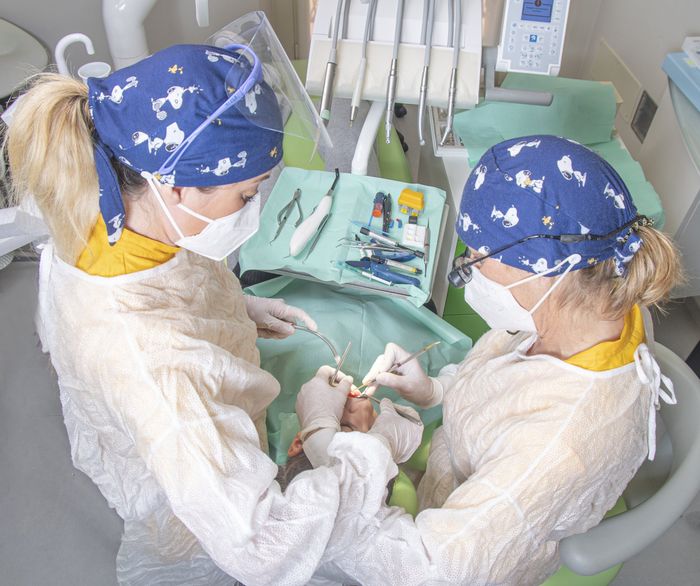PERIODONTOLOGY - DR. BALDI
LASER AND PERIODONTOLOGY - BALDI PRACTICE in FLORENCE
Periodontology is a branch in dentistry that deals with the prevention, diagnosis, treatment and maintenance of the soft and hard tissues surrounding the tooth (periodontal tissues), namely gingiva, alveolar bone, root cement, and periodontal ligament.
Periodontal conditions include diseases that can affect the supporting tissues which, if neglected, can then lead to tooth loss. We can divide these conditions up into two areas: superficial (gingivitis) and deep (periodontitis) issues. The health of the tooth's supporting tissues depends on and results from a state of continuous balance between the bacteria that can be found in the plaque along with the body's immune defences. When there is a lack in balance, this is the moment that periodontal disease becomes evident. These issues are therefore caused due to bacteria. It has been widely shown that failure in having sufficient oral hygiene will cause gingivitis in all patients, while the onset of periodontitis also comes from an individual (or genetic) predisposition. Plaque increase near the gingival margin initially results in a gingivitis which, if caught and well treated, can then regress completely.
Without treatment, gingivitis can progress to periodontitis a more severe form of the disease, resulting in progressive destruction of the supporting tissues of the teeth. Periodontal diseases do not heal spontaneously, but must be properly treated. An effective prevention is fundamental at the beginning. In the majority of affected patients, if cooperative, it is possible to slow down its progression.
Only by building-up a good doctor-patient relationship of trust and a close treatment partnership can good quality oral health be achieved.
PERIODontiTiS
Periodontitis (commonly known as gum disease) is a chronic infection distinguished by the progressive destruction of the supporting tissues of the teeth and the formation of periodontal pockets and / or gingival recessions. By periodontal pockets, we mean the space that is created between the tooth, gum and bone where tartar and bacterial plaque find greater shelter from home oral hygiene cleaning procedures. It is caused by some species of bacteria present in the plaque, which determine the onset of an infection that first affects the superficial tissues and then extends to the deeper supporting tissues (the latter condition can occur in individuals with a genetic predisposition). Some risk factors such as smoking, alcohol, improper diet, diabetes, etc., may encourage the development and progression of the disease. There are various forms of periodontitis with different clinical pictures and evolutions depending on the age of onset. The symptoms in the initial stages are silent and are limited to redness and / or gingival bleeding. Over time, however, the disease takes on different connotations with progressive gingival retraction, increased dental mobility, high sensitivity to heat and cold, presence of unpleasant odours and tastes, leading up to the appearance of periodontal abscesses.
The best cure for periodontal disease is certainly maintaining regular prevention, which must start from childhood, following some essential precautions:
- regularly and continually seeing a professional and specialised dental hygienist
- cleaning your teeth properly at home on a daily basis, after each meal
- pay close attention to any periodontal disease symptoms
The approach that is used at the Baldi Dental Practice is that we try to avoid surgery whenever possible, preferring more advanced and less invasive methods, such as professional oral hygiene sessions carried out using an operating microscope which helps us have a detailed and deep view of the pockets, and of the subgingival tissues. This is then accompanied by laser therapy sessions which help eliminate the diseased bacteria found in areas of the periodontium which cannot be reached by drugs, help reduce bleeding gums, close the periodontal pockets and regenerate the tissues.
At Dr. Baldi's Dental Practice, we offer all our patients the option of an advantageous 0% loan to defer dental costs!
Our practice will take care of the interest in full.
For information, please contact our offices.
Fill in our contact form for more information on procedures and funding








